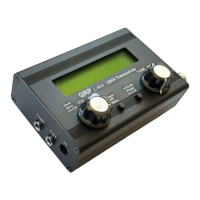Some keyers do implement automatic character spacing, such as the old (1973) Accu-Keyer
design by James WB4VVF see https://inza.files.wordpress.com/2011/01/accu-keyer.pdf .
This configuration therefore allows you to switch on automatic character spacing if you wish. In
this case, if you press a paddle too SOON, before the 3 dit durations have elapsed after the last
character completed, the keyer will wait until the correct time to start the next character.
In the even that you press the paddle too LATE, there is nothing the keyer can do to travel back in
time and force it to 3 dit lengths for you. You might have intended an inter-word space, for
example. So pressing the paddle too late cannot be corrected.
Semi QSK
OFF
This setting defines the break-in (QSK) behaviour of the radio. Two settings are possible:
OFF: indicates Full QSK mode. After the delay time for RF envelope shaping, the
Transmit/Receive switch is set to “Receive” shortly after key-up. In this way, you will hear the other
station (or any QRM, QRN etc) transmitting in between the dits and dahs of your own
transmissions. Many experienced operators like to be able to have a feel for what is happening on
the band, in between their key-downs. In some ways you feel like you are listening to your own
sidetone audio as just another signal on the band, and you can still hear other signals too.
ON: Semi-QSK mode is enabled. After key-up, there is a delay before the Transmit/Receive switch
is set back to “Receive” mode. The receiver is therefore kept muted during your whole CW
transmission, not listening to the band in between your transmitted symbols. Many operators
prefer to avoid the distraction of hearing the band between their dits and dahs. In Semi-QSK mode
the Transmit/Receive switch is set back to “Receive” only after a suitable delay (of 8 dit lengths),
long enough to occur only at the end of the transmission.
Practice mode
OFF
Normally you would leave Practice mode switched OFF. However if you want to practice sending
CW, and see if the CW Decoder can decode you, then you can switch Practice mode to ON. In
practice mode, the radio does everything it normally would, except that it never sends any RF
power to the antenna!
During practice mode, a ‘P’ is shown in the display to the right of the frequency on the top row.
Sidetone frq
700
QMX operang manual; rmware 1_00_012 23

